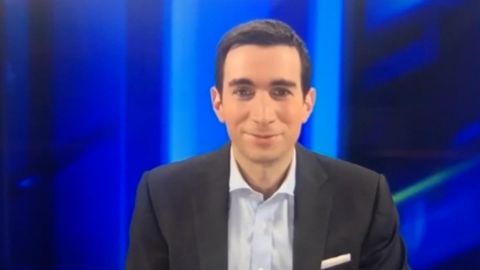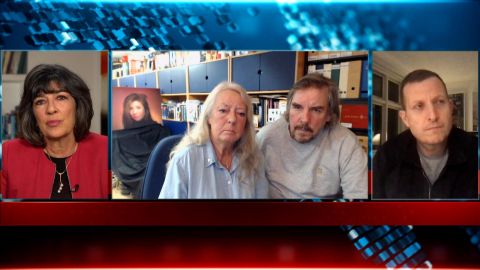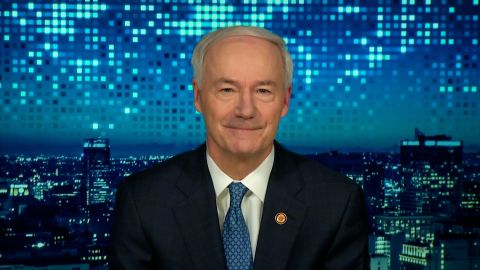Read Transcript EXPAND
CHRISTIANE AMANPOUR: Now, the GameStop subversives rocked wall street and the whole investment world when amateurs outwitted long-time professionals. Simply put: Lots of hedge funds had bet against the struggling store, so when Reddit users shared tips and then bought shares en masse, GameStop’s price rocketed up and set off a loss-making scramble among hedge funders until the share price came down again. Here is Andrew Ross Sorkin talking about what this all means for investors of the future.
WALTER ISAACSON: Thank you, Christiane. And Andrew Ross Sorkin, welcome back to the show.
SORKIN: Great to see you. Thank you, Walter, for having me.
ISAACSON: What a wild weak this has been with this Reddit rebellion, trying to take down GameStop. Tell me what happened and how what’s the outcome of this.
SORKIN: This is the wildest and craziest story that I feel like I’ve been involved in, in my whole career, actually. I don’t think I’ve ever seen anything like it. Literally a group enabled by social media of investors using a website called Reddit, got together and decided that they wanted to buy up the shares of GameStop, which is a retailer for online gaming that had to be honest had been faltering. Most people have been buying games online in fact. They don’t actually go to the store. And so there was a lot of what’s called a short interest. The big hedge funds and investors have been betting against the shares of gamestop thinking that it looked very much like blockbuster. If you remember blockbuster, back in the day. But this group of investors said two things. One, we think it’s worth more money, but two, we want to stick it to the shorts.
We want to stick it to the hedge fund community. And in very many ways, the investment thesis wasn’t a classic investment thesis at all. It was in certain cases considered a protest vote. It was a protest against the system. It was a protest against inequality. It was a protest against the hedge fund community and what they felt was a market that was unfair. And it was almost an opportunity for them to demonstrate that they could manipulate the market in the same way that I think so much of the public believes that the market is oftentimes manipulated by professionals. And so we watched the stock of GameStop, go from literally 10 $20 all the way up to over $450 at one point, based on nothing to do with fundamentals or the numbers or metrics completely divorced in truth from reality. And that created massive losses, at least in the short term, for some of these hedge funds. And so in some ways we watched the little guy beat the big guy. But it is not clear, that’s really what the ultimate outcome was.
ISAACSON: Isn’t there some truth though, to what they were saying, which is that the market is kind of rigged. It’s rigged against the little guy, and we need some ways to shake it up?
SORKIN: No question. In fact, if, if, if anything good comes out of this, I hope it is a real conversation in this country about what needs to happen to make the market more trustworthy, to make people feel like everybody has an equal opportunity, not just to make money, but also to lose it, which is also the unique aspect of this situation. Because for so many years, we have talked about the idea of investor protection. We didn’t want the quote unquote little guy to be able to lose money. But one of the things that came out of this was a whole group of people saying, at least, actually, no, no, no, we’re okay losing money. That’s fine. Stop trying to protect us because in fact, by you trying to protect us, what you’re really doing is protecting the big guy — you’re protecting the establishment, you’re protecting the hedge funders. And so in many ways it was a bit of an Alice in Wonderland moment because it really upended the way I think so much of the culture has thought about this before.
ISAACSON:Well Janet Yellen is gathering, The new Treasury Secretary is gathering some of the regulators to try, I think, to create more consumer finance protection. Aren’t there things she should be doing?
SORKIN: Well, there are, and I think there’s, there’s a worthy conversation to be had about that. Before I get to that, I just want to make one mention though, we’ve all talked about this, just even in the context that I’ve had this conversation with you as a protest vote, as, as something with a moral crusade. As the objective journalist that I hope I can be, it’s not clear that that’s necessarily what was really happening. And I think it’s worth just appreciating that. There were some people that were making this this point, but others that would suggest this was a classic pump and dump scheme that we’ve seen over and over and over again, masquerading as something else. And so this could be a transformative moment in so far as we look at the social media and this enabled, ability to have a voice this way, or we may look at this years from now and say, this was just another one of these schemes, if you will, where people were trying to profit, they induce other people into their scheme because you need other people to participate. You tell them it’s a, morally, moral protest rather than a profit of a pump and dump scheme and that, and we find out that that’s what it is. So I think there’s going to be lots of questions just about who manipulated, who, and we’ve also discovered along the way that it wasn’t just the little guy who’s made money here. We’ve seen the big guys, lots of hedge funds and others who actually made an extraordinary amount of money. And also in the process, the quote unquote, little guy, the retail investor has lost money because when the stock was trading at $400, somebody was buying it, it’s now back down to a hundred dollars.
ISAACSON:You said this may have been a pump and dump scheme masquerading as a populous revolt. Explain to me what a pump and dump scheme is and whether or not that’s legal, whether or not that’s wrong.
SORKIN: Well, it is illegal to participate in a pump and dump scheme in so far as you cannot lie to the public about a stock. You cannot try to quote unquote manipulate the market. And there’s very interesting distinctions about what it means to manipulate a stock. If you publicly say that your intent is to manipulate a stock, that actually unto itself is illegal. It’s a very interesting, issue. And it there’s a, it there’s a gray line here about freedom of speech, and that’s going to be very central to whatever cases get brought one way on whether they get brought against hedge funds or whether they get brought against, some of these retail investors. A pump and dump scheme is when you try to push up the stock, you sell at the top, but everybody else sells below. And so that’s part of this, but it also raises questions about short selling — the idea, you know, to some people it’s un-American to have shorts on the idea that people are betting against companies. There’s another view that short selling helps create transparency. People who are betting against things have oftentimes unearthed major frauds like Enron, and, and create a transparency in the market. So there’s a pro and a con to every element of this.
ISAACSON:Should there be more consumer protection in this system?
SORKIN: Well, I think there’s a couple, a couple of big issues to consider. And the answer is yes. One of the things that happened during this process is, and really facilitated all of this was, an app called Robinhood, which was a now upstart online brokerage firm, where a lot of these young people had flocked to. And because they were a startup, they didn’t have a massive capital cushion, meaning they didn’t have a huge amount of money in the bank. And so when people started trading and buying up GameStop and some of these other stocks, they ended up curtailing their ability to keep buying because they actually ran out of money to keep making deposits. And a lot of people say that the stock fell and people were injured along the way in the past week because of that. So I think one of the things that’s going to come of this is how these brokers, these online brokerage houses, are regulated.
I think that’s going to be a major piece of it. What kind of disclosure should be around short selling? You know, we require the big investors to disclose whether they are long Amazon or, or, or long, Microsoft, if, especially if they are not especially, but if they have a more than 5% holding. There is no disclosure required on an individual basis for short-selling. Part of the reason is in fact sort of what happened we saw happened last week, which was the view that investors could start to target those funds or those firms, if they knew that they were on the other side, because part of what happened here was a supply and demand imbalance of sorts, which was because there were so many people who had sold short, these investors, very clever realized that if they push the stock up, they would force these people who are betting against it to actually get out of their positions, which unto itself would push the stock up.
ISAACSON:Does any of this have any real value for our economy or should we try to do things that reduce the amount of this craziness?
SORKIN: Well, I think you just hit on the most important point. This is all about trading. This is not about investing at all. And to some degree maybe these investors were trying to demonstrate that — that so much of the market has been turned into a casino that, that it’s made a mockery of the idea of investing in certain ways. So I do think we need to figure out ways to incentivize long-term investing and disincentivize this kind of short-term trading, because that’s what it is.
ISAACSON:On a broader scale, are we allocating too much time, energy, IQ points, finances to things like trading, instead of having people spend those hours doing things that could be productive and good for society?
SORKIN: Oh, goodness, this is, this is, one of the great meta questions of, of our time. And I think, you know, ever since the financial crisis, but maybe even before that, we’ve been talking about whether too much of our economy has been financialized — that it is a, to some degree, there’s a financial engineering element to it. I’m of two schools of thought. I would like to have smart people allocating capital. I do think that’s important. I think the allocation of capital is not insignificant, but I also think as you noted, I don’t think we want to be promoting a casino and too much of, I think what’s taking place right now in particular is the casino. I’d also make one note though. A lot of this has been driven by the amount of liquidity that the federal reserve and so much of the stimulus money that we’ve put into the economy has created a lot of the folks who are now trading at this rapid pace today are unfortunately doing it sometimes with stimulus checks. This idea that we have free money has created a bit of this casino-like atmosphere right now. And it’s ironic given that we’re living in the middle of a pandemic.
ISAACSON:But the high speed trading and the financialization of the economy and the hedge fund seems to be a major driver in wealth inequality today. I mean, is that another problem with this? And should there be an alternative minimum tax or something that makes it so that the financialization of our economy doesn’t keep driving wealth disparities?
SORKIN: No question. I look, you know, that I I’ve been advocating for a number of different tax programs that I hope, we create a more fair and level playing field. That’s so critical. I’ve talked about an AMT and alternative minimum tax, especially at the high end, because you have people who are, have managed to make extraordinary amounts of money, but they’d be able to able to use it, do it using capital gains rates or carried interest rates. I mean, I think we need to figure out a more equal way to think about this. At the same time, one observation though about high-frequency trading and hedge funds and the like, which is, we need to think about who the money, where the money comes from, that’s being invested. Most of the money that’s being invested in high-frequency trading for example, is pension money. It actually is our money. It is teachers and firemen and policemens’ retirement. It is. And well, I would argue a disproportionate amount of the profits are going to the hedge fund that is managing that money. And we need to do something about that, but that can be done in the context of taxes. We do need to recognize that when we talk about a big firm, like a BlackRock, for example, BlackRock, ultimately, may be managing $9 trillion, but it’s not $9 trillion of Larry Fink’s money. It’s our money.
ISAACSON:If Secretary of Treasury, Janet Yellen, or President Joe Biden called you up and said, what are the three or four reforms we could make, not just coming out of this, uh, Reddit, issue, but just, uh, for our economy now and in trading and, hedge funds — what reforms would you make?
SORKIN: I would be focused mostly on taxes. I think that so much of this country feels that the system is rigged. The broader system is rigged, and that it’s just fundamentally unfair. So I look at things like carried interest, where effectively private equity and venture capital investors are are being taxed at a rate that’s so substantially lower than just about anybody else. It wouldn’t even raise an enormous amount of money in the grand scheme of things, but it would say to the public that we care about fairness, and we’re trying to level the playing field. I think there are certain, a wealth income number you would make capital gains the equivalent of income taxes, so that if you’re making more than a million dollars a year in capital gains, that actually should be considered income because it’s, it shouldn’t be considered a different thing. I think that, I think it’s much more in that way that we can probably get there than necessarily in the context of fundamentally rewriting the stock market unto itself.
ISAACSON:Do you think that we need another big stimulus COVID relief the way Biden’s proposing it? Are you more worried that that will add to the deficit?
SORKIN: I am somebody who does worry about the deficit. Um, I would like to see more stimulus relief. If there, if it could be targeted, uh, in a perfect world, you would do it that way. The question is, is it practical? I think actually one of the lessons of this crisis that we need to figure out for the next one is how we can actually create more targeted relief efforts when, and if we need them in the future, I think that’s a critical element of this. The other thing I think we do need to think about is I might put money into the system. What I call a restart up fund out of start a fund, a restart up fund that you might start to make available, come this summer or come September when hopefully the world gets back to some semblance of normal. And a lot of these businesses are then going to, uh, need funds to really remake themselves. Uh, I am concerned that some of this money is going to be wasted, uh, in truth, not in terms of protecting people who desperately need the protection, but keeping businesses, um, going temporarily when really what you do. And, and I will lose points for saying, this is you probably want to temporarily shut down for some period. And then having restart fund that allows you to continue when the time is right. And when the health precautions and procedures are in place, so you can do it properly.
ISAACSON: Andrew Ross Sorkin. It’s always interesting. And thank you so much for joining us.
SORKIN: You’re my hero. So thank you for having me.
About This Episode EXPAND
Arkansas Governor Asa Hutchinson discusses vaccine rollout and the state of the Republican Party. Tobias Lindholm, Ingrid Wall and Joachim Wall discuss the murder of journalist Kim Wall and the new HBO series “The Investigation.” Andrew Ross Sorkin explains how Reddit users threw the stock market into disarray.
LEARN MORE


